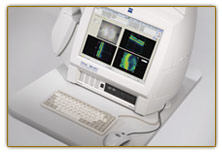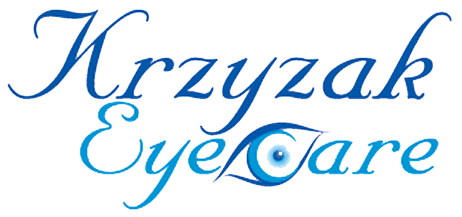Macular Degeneration
 Macular degeneration is the physical disturbance of the center of the retina called the macula. The macula, which is about the size of the capital letter “O” in this sentence, is the part of the retina which is capable of our most acute and detailed vision. We use the macula for reading, driving, recognizing faces, watching television, and fine work. Macular degeneration is the leading cause of legal blindness in people over age 55. (Legal blindness means that a person can see 20/200 or less with eyeglasses.) Even with a loss of central vision, however, color vision and peripheral vision may remain normal. Vision loss usually occurs gradually (but may be acute) and typically affects both eyes at different rates.
Macular degeneration is the physical disturbance of the center of the retina called the macula. The macula, which is about the size of the capital letter “O” in this sentence, is the part of the retina which is capable of our most acute and detailed vision. We use the macula for reading, driving, recognizing faces, watching television, and fine work. Macular degeneration is the leading cause of legal blindness in people over age 55. (Legal blindness means that a person can see 20/200 or less with eyeglasses.) Even with a loss of central vision, however, color vision and peripheral vision may remain normal. Vision loss usually occurs gradually (but may be acute) and typically affects both eyes at different rates.
Causes of Macular Degeneration
The root causes of macular degeneration are still unknown. There are two forms of age-related macular degeneration (ARMD), “wet” and “dry”. Seventy percent of patients have the “dry” form, which involves thinning of the macular tissues and disturbances in its pigmentation. Thirty percent have the “wet” form, which can involve bleeding within and beneath the retina, opaque deposits, and eventually scar tissue. Different forms of macular degeneration may occur in younger patients, and may be linked to heredity, diabetes, nutritional deficits, head injury, infection, or other factors.
Recent research studies have identified key risk factors for the development of AMD. They include:
- Family history of macular degeneration
- Smoking (even if you have smoked and quit)
- Ultraviolet light exposure (via sunlight) without protection
- Low levels of critical macular pigments (Zeaxanthin and Lutein)
Other risk factors are: having light skin and eye color, being overweight, and female gender. The following signs may be indicative of macular problems. Anyone experiencing these symptoms should contact Krzyzak Eyecare for an exam immediately:
- Straight lines appear distorted and, in some cases, the center of vision appears more distorted than the rest of the scene.
- A dark, blurry area or “grey-out” appears in the center of vision.
- Color perception changes or diminishes.
The following are NOT known to be linked to macular degeneration:
- Floaters (moving spots caused by debris floating in the vitreous fluid between the lens
and the retina). - Dry eye syndrome.
- Cataracts and cataract surgery.
Detecting Macular Degeneration
A new diagnostic technique called Optomap scanning laser imaging is highly diagnostic in detecting the early signs of macular degeneration. By comparing Optomap images from exam to exam your doctors at Krzyzak Eyecare are able to detect retinal findings that may harbor future development of macular degeneration and implement whatever preventative measures are possible.
Macula Optical Coherence Tomography

We continue to lead the field in the utilization of advanced technology to provide early diagnosis and treatment of eye diseases such as ARMD. (OCT) is a new diagnostic tool to detect physical changes in the macula associated with ARMD. OCT is able to 3-demensionally evaluate the anatomy of the macula and detect earliest changes associated with ARMD.
Macular Degeneration FAQ
Q. Is early detection of macular degeneration important?
A. Early detection is very important because a patient destined to develop macular degeneration can sometimes be treated before symptoms appear, and this may delay or reduce the severity of the disease. Furthermore, as we develop better treatments for macular degeneration, whether they are medicinal, surgical, or low vision aids, those patients diagnosed with macular degeneration can sooner benefit from them.
Q. If I have macular degeneration in one eye, will it develop in the other?
A. Yes, this is usually the case. In the early stages, only one eye may be affected, but as the disease progresses, both eyes are usually affected.
Q. Is there a cure for Macular Degeneration?
A. At this time there is no known cure for macular degeneration. In some cases, macular degeneration may be active and then slow down considerably, or even stop progressing for many, many years. One day, research may show us how to prevent and reverse the disease. Today, there are ways to arrest macular degeneration, depending on the type and the degree of the condition. These range from nutritional intervention to laser surgery of the blood vessels, and use of agents to stem the tide of abnormal blood vessel growth under the macula. We also have developed low vision aids and techniques for maximizing the use of peripheral vision to help patients adapt better to their loss of central vision. Educating susceptible groups about macular degeneration can enhance early detection and early treatment. The doctors of Krzyzak Eyecare will recommend a course of treatment specifically designed for each patient and will advise you how often you should be examined to maintain the proper course of treatment.
Q. Can nutrition help treat macular degeneration?
A. Some scientists have suggested an association between macular degeneration and high saturated fat, low carotenoid pigments, and other substances in the diet. There is evidence that eating fresh fruits and dark green, leafy vegetables (such as spinach and collard greens) may delay or reduce the severity of age-related macular degeneration. Taking anti-oxidants like Vitamins C and E may also have positive effects. Zinc, however, has shown mixed results. In some people, the long-term use of zinc causes digestive problems and anemia; its use is probably not worth the potential problems. Supplementation of the critical protective macula pigment caratenoids Lutein and Zeaxanthin is key in reducing the risk of developing ARMD based on numerous research studies presented over the past few years. You should always consult your physician to determine appropriate dosages. Krzyzak Eyecare doctors keep abreast of the continuing research in nutrition and its effect on macular degeneration.
Q. Can surgery help cure macular degeneration?
A. Surgery to remove the scar produced by macular degeneration has been successful in younger patients, but less successful in older patients. If the degeneration is associated with leaking blood vessels in the center of the macula, and vision is worse than 20/70, laser surgery, called photocoagulation, is recommended. This will not improve vision but generally reduces further vision loss. Retinal transplantation is a new experimental approach to macular degeneration, but is still in the research stage. If your Krzyzak Eyecare doctor feels you would benefits from such research he/she will refer you to a retinal specialist who will determine if your participation in a study would benefit you.
Q. Is macular degeneration hereditary?
A. Macular degeneration appears to be hereditary in some families but not in others. Since macular degeneration affects most patients later in life, it is difficult to study successive generations in a family. Recent studies of twins indicate that both genetic and non-genetic factors play important roles in age-related macular degeneration. Research to determine the genes associated with hereditary macular degeneration will help lead to early detection, early intervention, and possible cures.
Q. Does sunlight affect macular degeneration?
A. Yes. It has been demonstrated that the blue rays of the spectrum seem to accelerate macular degeneration more than other rays of the spectrum. This means that very bright light, such as sunlight or its reflection in the ocean and desert, may worsen macular degeneration. Special sunglasses that block out the blue end of the spectrum may decrease the progress of the disease. Also, Lutein ans Zeaxanthin absorb short wavelength blue light. Again, more research is needed in this area.
A. Yes. Hypertension tends to make some forms of macular degeneration worse, especially in the “wet” form where the retinal tissues are invaded by new blood vessels. The medications used to treat hypertension have not been shown to have any direct effect on macular degeneration, but they may slow progression of the disease by reducing hypertension.
Q. Does smoking or second hand smoke contribute to macular degeneration?
A. Yes. Any type of smoking or exposure to tobacco smoke can accelerate the development of the “wet” type of macular degeneration. Also, avoid taking any Beta Carotine if you are a smoker due to reported higher risk for cancer development.
